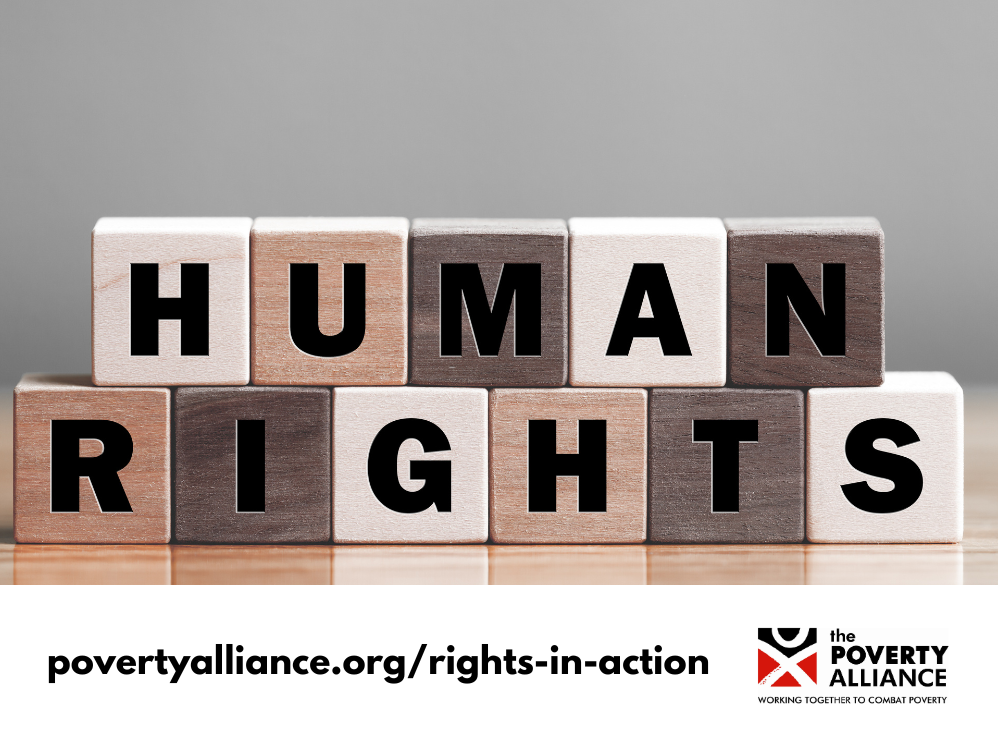
Lydia Murphy, Development Officer, The Poverty Alliance
Poverty is a human rights issue, so the Scottish Government’s commitment to a Human Rights Bill for Scotland has been welcomed by our membership.
It will be a big step forward in creating a Scotland where no one is left behind and where our fundamental human rights are a reality for all. It has the potential to transform the way we think about and address poverty in Scotland. It will support the First Minister’s mission of eradicating child poverty.
Earlier this month, some 35 members attended our event ‘What’s Next For Human Rights in Scotland: Policy and Practice’. For me – both personally and professionally – it was an enlightening and inspiring event.
We heard Mhairi Snowden of the Human Rights Consortium Scotland highlight what’s at stake - human rights are about power and so they are often inconvenient to people in power. There is a tendency to sideline them, and this is true in Scotland. And picking and choosing human rights doesn’t work for people - human rights protections must always be a package and apply equally to all.
Neil Cowan of Amnesty International UK said the Human Rights Bill is about making public services and organisations accountable to the people they serve. It has the potential to increase social justice, reduce poverty, and help people make their rights a reality. He called for need many different voices from different perspectives to speak out in support of the Bill, and to shape it as it moves through parliament.
We are all operating in a difficult context, with the continued impact of the cost of living crisis, a difficult fiscal environment and looming public sector spending cuts. Our members were clear that the difficulty of the current context is exactly why the Bill is needed. Frontline organisations are working in extreme circumstances, trying to tackle the worst levels of poverty, inequality and injustice seen for decades. Attendees noted endemic poverty and inequality, the two-tier food system, and the increasing role of the third sector providing an alternative social security system as particular concerns. However, attendees were hopeful that a Human Rights Bill could help to rewire public services and the way we think about budgets to turn this tide.
People felt disappointed and let down by the delays in introducing the Bill, and were concerned that it would be watered down.
I was privileged to chair a panel discussion with Clare MacGillivray from Making Rights Real, Karen Wylie of Glasgow Disability Alliance, and Sophie Shields of the Institute for Inspiring Children’s Futures. I started by emphasizing that a human rights approach helps ensure that poverty is understood as a structural issue, and centres the dignity, autonomy and participation of people with experience of poverty.
Clare highlighted the importance of the PANEL principles, developed by the Scottish Human Rights Commission, to provide a framework to support public authorities and civil society organisations. They show that human rights approaches aren't scary, but can be put in place in a practical, pragmatic way. She talked about Making Rights Real’s fantastic work with Gypsy Traveller communities, building their capacity to identify the human rights issues they are experiencing and supporting them to hold public authorities to account. They also work on gender-sensitive human rights budgeting with Fa’side Women's & Girls Group, and the Scottish Women’s Budget Group. For Clare, a clear benefit of taking a human rights based approach is the shift in power - the rights holders are empowered - and how human rights inspire hope that change can happen. A human rights based approach allows you to bring people together around universal values. When people are brought together, that is when change happens.
Sophie highlighted how a children’s rights based approach is very similar to a human rights based approach - children’s rights are human rights. She talked about the vital importance of helping children participate meaningfully in the decisions that impact them: it is not just about getting their views, but also making sure those views are heard and acted on. A children's rights based approach is being accountable to, with and for children. Children have evolving capacity so we need to meet them where they are at.
Karen underscored the importance of the Human Rights Bill having teeth. This is particularly a concern due to the proposed lack of duty to comply on public authorities for the rights contained in the UN Convention on the Rights of People with Disabilities. There must be recognition of the initial barriers faced by disabled people and of the higher costs of living that are forced upon them.
In the next discussion, our members identified the way in which taking a human rights based approach to poverty puts people first and helps to combat stigma as key benefits of taking a human rights based approach to poverty. However, taking a human rights based approach to poverty requires fair funding, long term funding, which is not always available to ensure participation is always meaningful. Continued capacity building for the sector, and for Scottish Government and public sector employees is also important to for us to take a human rights based approach to poverty across society.
Although there were examples in the room, of people who had supported rights holders to pursue accountability in the face of significant resistance, many felt that this should not be the case. There is a need for accountability from duty bearers, and legal mechanisms to support this.
The human rights issues people faced are often interconnected, due to the interrelatedness of human rights and the complexity of all of our lives. This means that taking a human rights based approach requires collaboration. It also requires us to talk about poverty as a human rights issue, so that colleagues and allies are aware that the issues we see in our work are human rights issues, and human rights frameworks are for all of us. We ended the event with a final discussion, planning what actions we can take to support a strong Human Rights Bill for Scotland and what actions can we take to further embed taking a human rights based approach across Scottish civil society.
Watch this space for the results of that planning in the coming months.


Enter your email address to receive regular e-updates about our work. If at any time you want to stop receiving these, simply contact us. We’ll keep your details safe and won’t share them with any other organisations for their marketing purposes. For full details see our Privacy Policy.